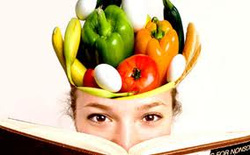|
from ACE Pro Source  Good news for all you picky eaters (and, especially, parents of picky eaters): A new study suggests it may be possible to train the brain to prefer healthy low-calorie foods over unhealthy higher-calorie foods. According to new research by scientists at the Jean Mayer USDA Human Nutrition Research Center on Aging (USDA HNRCA) at Tufts University and at Massachusetts General Hospital, a brain scan study in adult men and women suggests that it is possible to reverse the addictive power of unhealthy food while also increasing the preference for healthy foods. “We don't start out in life loving French fries and hating, for example, whole-wheat pasta,” says senior study author Susan B. Roberts, Ph.D., director of the Energy Metabolism Laboratory at the USDA HNRCA. “This conditioning happens over time in response to eating—repeatedly!—what is out there in the toxic food environment.”
Scientists have suspected that, once unhealthy food addiction circuits are established, they may be hard or impossible to reverse, subjecting people who have gained weight to a lifetime of unhealthy food cravings and temptation. To find out whether the brain can be retrained to support healthy food choices, Roberts and her colleagues studied the reward system in 13 overweight and obese men and women, eight of whom were participants in a new weight-loss program designed by Tufts University researchers and five who were in a control group and were not enrolled in the program. Both groups underwent magnetic resonance imaging (MRI) brain scans at the beginning and end of a six-month period. Among those who participated in the weight-loss program, the brain scans revealed changes in areas of the brain’s reward center (the putamen, a round structure located at the base of the forebrain) that is associated with learning and addiction. After six months, this area had increased sensitivity to healthy, lower-calorie foods, indicating an increased reward and enjoyment of healthier food cues. The area also showed decreased sensitivity to the unhealthy higher-calorie foods. “Our study shows those who participated in [the weight-loss program] had an increased desire for healthier foods along with a decreased preference for unhealthy foods, the combined effects of which are probably critical for sustainable weight control,” explains co-author Sai Krupa Das, Ph.D., a scientist in the Energy Metabolism Laboratory at the USDA HNRCA and an assistant professor at the Friedman School. “To the best of our knowledge, this is the first demonstration of this important switch.” The authors hypothesize that several features of the weight-loss program were important, including behavior change education and high-fiber, low-glycemic menu plans. “Although other studies have shown that surgical procedures like gastric bypass surgery can decrease how much people enjoy food generally, this is not very satisfactory because it takes away food enjoyment generally rather than making healthier foods more appealing,” says lead author Thilo Deckersbach, Ph.D., a psychologist at Massachusetts General Hospital. “We show here that it is possible to shift preferences from unhealthy food to healthy food without surgery, and that MRI is an important technique for exploring the brain's role in food cues.” What does this mean for fitness professionals? Encourage your clients to continue trying new, healthier foods and to not give up on their efforts to eat more nutritiously. Allay their fears that they may be too old to change their palates and remind them that it may simply be a matter of time before their preferences adapt to more healthful fare. The same can be said for kids—keep offering up healthy foods, even if they turn up their noses at what is put in front of them. Research suggests it can take as many as 15 tries before a child will accept a new food. “There is much more research to be done here, involving many more participants, long-term follow-up and investigating more areas of the brain,” Roberts adds. “But we are very encouraged that the weight-loss program appears to change what foods are tempting to people.” Reference Deckersbach, T. et al. (2014). Pilot randomized trial demonstrating reversal of obesity-related abnormalities in reward system responsivity to food cues with a behavioral intervention. Nutrition & Diabetes, 4, 9, e129.
0 Comments
Your comment will be posted after it is approved.
Leave a Reply. |
Archives
September 2024
Categories
All
|

 RSS Feed
RSS Feed